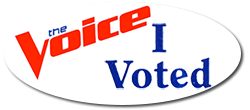This semester, Ed Felten and I are teaching a Freshman Seminar called “Facebook: The Social Impact of Social Networks.” This week, the class is discussing a recent article published in the journal Nature, entitled “A 61-Million-Person Experiment in Social Influence and Political Mobilization“. The study reveals that if Facebook shows you a list of your closest friends who have voted, you are more likely to do so yourself. It is a fascinating read both because it is probably the first very-large-scale controlled test of social influence via online social networks, and because it appears that without much work the company was able to spur about 340,000 extra people to vote in the 2010 midterm elections.
 I confess that last night I watched some of the wildly popular reality TV competition The Voice. What can I say? The pyrotechnics were more calming than the amped-up CNN spin-zoners. It was the first day that the at-home audience began voting for their favorites. Carson Daly mentioned that the show would take the requisite break on Election Night, but return in force on Wednesday. (Incidentally, I can’t decide whether or not this video urging us to “vote Team Cee-Lo” is too clever by half).
I confess that last night I watched some of the wildly popular reality TV competition The Voice. What can I say? The pyrotechnics were more calming than the amped-up CNN spin-zoners. It was the first day that the at-home audience began voting for their favorites. Carson Daly mentioned that the show would take the requisite break on Election Night, but return in force on Wednesday. (Incidentally, I can’t decide whether or not this video urging us to “vote Team Cee-Lo” is too clever by half).
In 2006, the Washington Post Op-Ed page observed that more “votes” were cast for the winner of American Idol than for George Bush in 2004 (although it notes that the two are not really comparable for a variety of reasons). It also suggested that technology can make voting easier, but comes with downsides. As Alex Halderman and his students demonstrated in 2010, and as our panel of experts discussed last week, online voting poses very serious risks.
Aside from resorting to unreliable reality TV voting methods, what can technology do to encourage citizens to vote? Since 2008, campaign managers have made their “social media strategy” an integral part of their broader campaign strategy (Obama’s 2008 New Media Director, Joe Rospars, described this in a lecture here at the Center for Information Technology Policy). Dozens of web sites and apps are making better use of the internet to spur voting. Citizens can now easily find their local polling station or other critical information. Nevertheless, I am struck by the core finding in the Nature article–that close social ties with self-professing voters seem to matter exponentially more than other factors. The reality television experience undoubtedly transcends the one-way medium of transmission, and not just because so many shows now employ the “voting” model popularized by American Idol. Committed fans of these shows often socialize, offline and online, around the experience.
For decades, the “I Voted” sticker has served as a physical badge of honor and a social pressure to do your civic duty. I don’t know what percentage of reality television viewers would similarly flaunt pride in their votes–although probably many would–but I wonder if there is something similar that social media can offer us for civic participation.
And, most importantly, what would Cee-Lo do?
